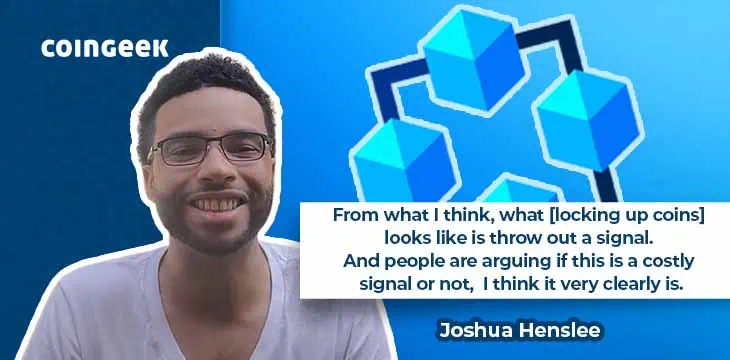|
Getting your Trinity Audio player ready...
|
There’s been a lot of chatter in the BSV blockchain community lately about locking up coins. In this video, Joshua Henslee shares his view on the idea. He clarifies that he will participate and explains a little bit about how it will all work.
What does locking coins mean?
Jack Liu and the RelayX team pioneered this idea. In a nutshell, it involves locking up coins in Bitcoin script for a specific period of time. This could be either time-based or until a certain block height is reached. In effect, this would create trust for the one locking their coins.
Henslee says doing this is “pretty secure” and even has some security benefits. Even if someone’s private keys were hacked or stolen, the coins could not be moved until the unlock conditions were met.
Why would anyone lock up their coins?
The idea behind doing this is to throw out a costly signal. This was discussed in a recent CoinGeek Discussions episode. There’s still lots of debate as to whether it is, indeed, a costly signal, and the idea has caused some vitriolic discussion within the community. Henslee believes it is a strong signal as it eliminates the idea that most BSVers are short-term price pumpers and shills.
Addressing concerns about the number of coins in circulation, Henslee finds them “absurd.” There are 2.1 quadrillion satoshis, and with one sat fee, it isn’t going to be a problem, he says.
To incentivize people to participate, Henslee suggests that access to a group chat or a social media platform for those who have locked up 100 or more coins could be considered. Sure, some will see this as excluding others, but we can’t sit in on a Microsoft (NASDAQ: MSFT) shareholders meeting unless we own a substantial number of shares, and this would be the same, in his view.
As far as the debate and discussion this issue has generated, Henslee thinks it’s a good thing. It stimulates conversation, and there’s nothing else like it happening in the rest of the digital currency industry.
This can only happen in the original Bitcoin
Henslee points out this can only happen on the BSV blockchain—the original Bitcoin. It wouldn’t work on BTC or BCH. Would BTC holders do it even if they could? He doubts it. While they talk about HODLing, most are interested in short-term price pumps.
Henslee believes we’ll see lots of coins locked up on day one if this goes ahead. It a signal that the entire cryptocurrency industry has not seen before, and he will participate regardless of what others think about it.
Henslee calls the idea “meme magic” and says that nobody does it in the worst-case scenario, and we move on. For now, he’s interested to see the reaction and what happens to the BSV token price if many people decide to participate.
Summarizing this Joshua Henslee video
- Henslee addresses the recent idea of locking up coins in the BSV blockchain community. He’s in favor of it and intends to participate if it occurs.
- Locking up coins would involve using a Bitcoin script to lock them until a certain block height or specific time had been reached. Henslee thinks this has security benefits, which he outlines in the video.
- There has been debate over whether locking coins up is a ‘costly signal.’ He thinks it is and that it tells the wider industry that BSVers are not interested in cashing out for short-term fiat gains.
- Henslee points out that this couldn’t be done on BTC or BCH. They have changed the functionality too much, and it wouldn’t work without some backtracking.
- Whatever happens, Henslee thinks the discussion is positive, and it’s one of the most interesting developments to occur in a while. He’s looking forward to observing people’s reactions and seeing what happens to the BSV blockchain if this goes ahead and lots of people participate.
Watch: Using nLockTime to create complex contracts on Bitcoin

 07-03-2025
07-03-2025 





